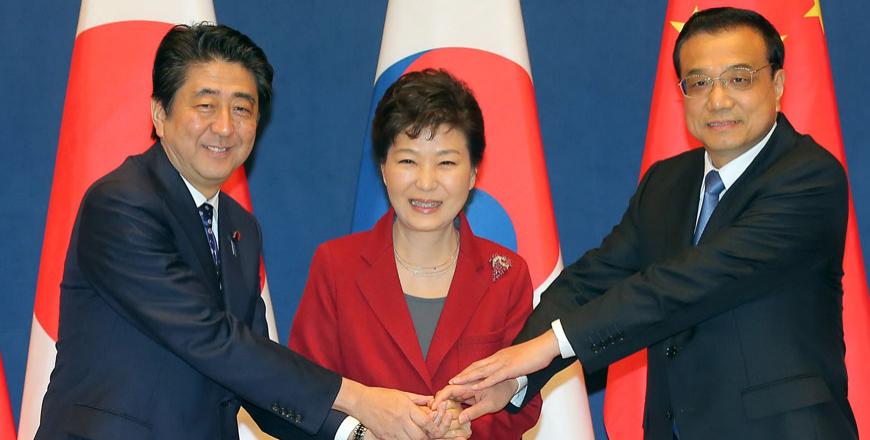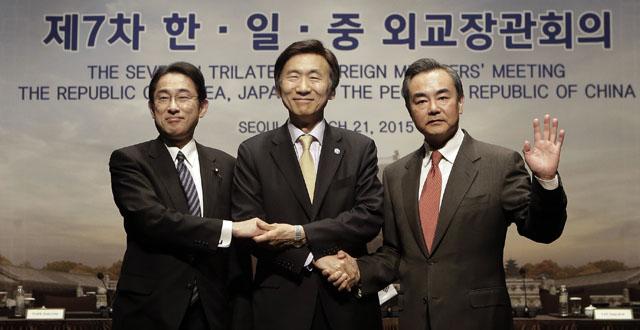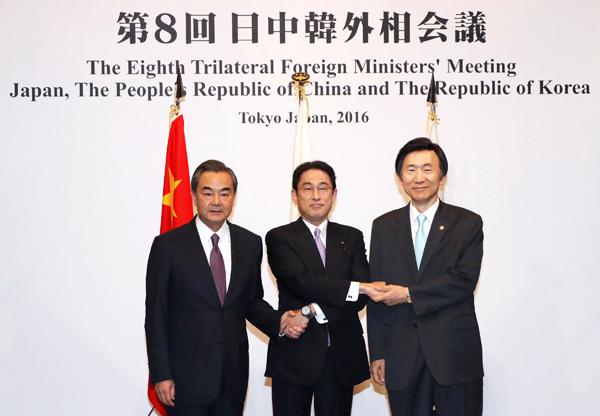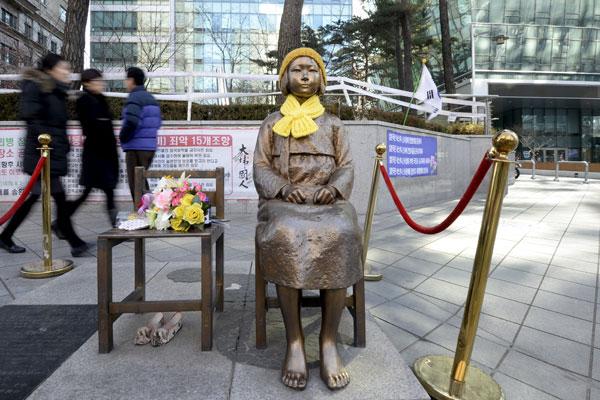You are here
China, Japan, South Korea pledge economic cooperation at first summit in over three years
By Reuters - Nov 01,2015 - Last updated at Nov 01,2015

South Korean President Park Geun-hye (centre) shakes hands with Chinese Premier Li Keqiang (right) and Japanese Prime Minister Shinzo Abe before a trilateral summit at the Presidential Blue House in Seoul, South Korea, on Sunday (Reuters photo)
SEOUL — The leaders of South Korea, Japan and China pledged to work towards greater economic integration at their first joint meeting in over three years on Sunday, as they work to ease tensions stemming from Japan's wartime past.
South Korean President Park Geun-hye, Japanese Prime Minister Shinzo Abe and Chinese Premier Li Keqiang also said they would to resume annual meetings which had been suspended since 2012 amid disagreements over history and territory.
Park said she agreed with Abe and Li to work towards the conclusion of a 16-nation free trade area as well as a separate three-way free trade deal that has been on the table since 2013.
"We agreed to work together for the conclusion of the Regional Comprehensive Economic Partnership [RCEP]," Park told a joint news conference with Li and Abe after the summit.
"We agreed to expand economic and social cooperation for the mutual prosperity of Northeast Asia, and also to strengthen cooperation among the three countries to create new growth momentum."
China has been a key proponent of RCEP, which would create the world's biggest free trade bloc of 3.4 billion people.
Negotiators for the 16 countries, which also include India and the 10 states of the Association of Southeast Asia Nations met in Busan, South Korea, last month to discuss market opening and tariff reductions on goods and services.
But progress has been slow for the pact first proposed four years ago even as the US-backed Trans-Pacific Partnership trade pact that includes Japan was struck earlier in October.
South Korean and Chinese ties with Japan have been troubled by what they see as repeated failures by leaders in Tokyo to properly atone for wartime atrocities, in particular for Seoul over "comfort women", as the mostly Korean women forced into prostitution at Japanese military brothels are called.
The meeting is a diplomatic breakthrough for Abe, who had long sought a one-on-one meeting with Park and the resumption of the trilateral summit. The two will hold a bilateral meeting on Monday, the first since both took office.
On Sunday he credited Park for restoring the forum.
"It is a breakthrough for the region and the three countries that we hold this trilateral summit for the first time in three and a half years through the initiative of President Park," he told the news conference.
"Japan, China and South Korea are neighbours, and because we are neighbours, there are difficult issues among us."
Li said Japan had yet to do all it can to appease the suspicion held by the two countries that suffered under its wartime aggression about Tokyo's view on promoting genuine regional cooperation.
"Cooperation should be made on the basis of handling sensitive issues such as history in a proper way and by promoting mutual understanding in Northeast Asia," Li said at the opening of the three-way summit.
"It is regrettable that even among our three very close countries, there cannot be a deeper understanding among us."
Nuclear North
Sunday's meeting highlighted a balancing act Park faced between her country's rapidly developing ties with Beijing and US pressure to mend relations with Tokyo, Washington's key Asian ally in the face of an increasingly assertive China.
It also afforded Park an opportunity to be seen addressing issues of regional interest that included tackling North Korea's arms programme.
The leaders in a joint statement reaffirmed "firm opposition to the development of nuclear weapons on the Korean peninsula", referring to North Korea's pursuit of atomic weapons in the face of international sanctions and condemnation.
There was no mention by the leaders of tensions in the South China Sea where a US destroyer sailed close to one of Beijing's man-made islands in the most significant US challenge yet to territorial claims by China in the Spratly archipelago.
Related Articles
The foreign ministers of South Korea, China and Japan pledged to set up a trilateral leadership summit at "the earliest" opportunity as they met in Seoul on Saturday for the first time in nearly three years.
TOKYO — Foreign ministers from Japan, China and South Korea began a two-day meeting on Tuesday with their countries at odds over territorial
SEOUL — South Korea and Japan reached agreement Monday on their dispute over wartime sex slaves that has soured relations for decades, as To

Opinion
Apr 09, 2025
Apr 08, 2025
- Popular
- Rated
- Commented
Apr 08, 2025
Apr 09, 2025
Newsletter
Get top stories and blog posts emailed to you each day.

















